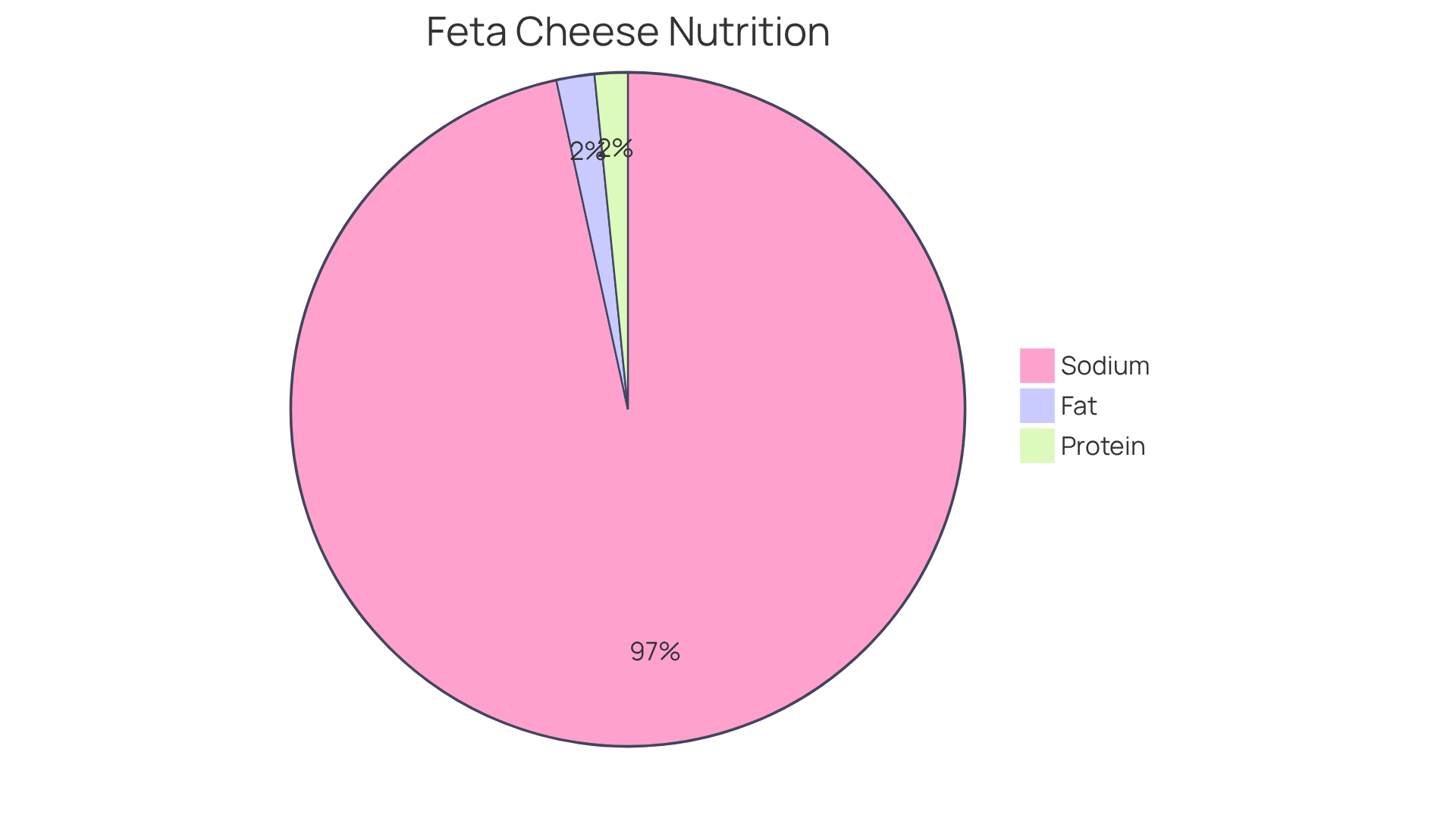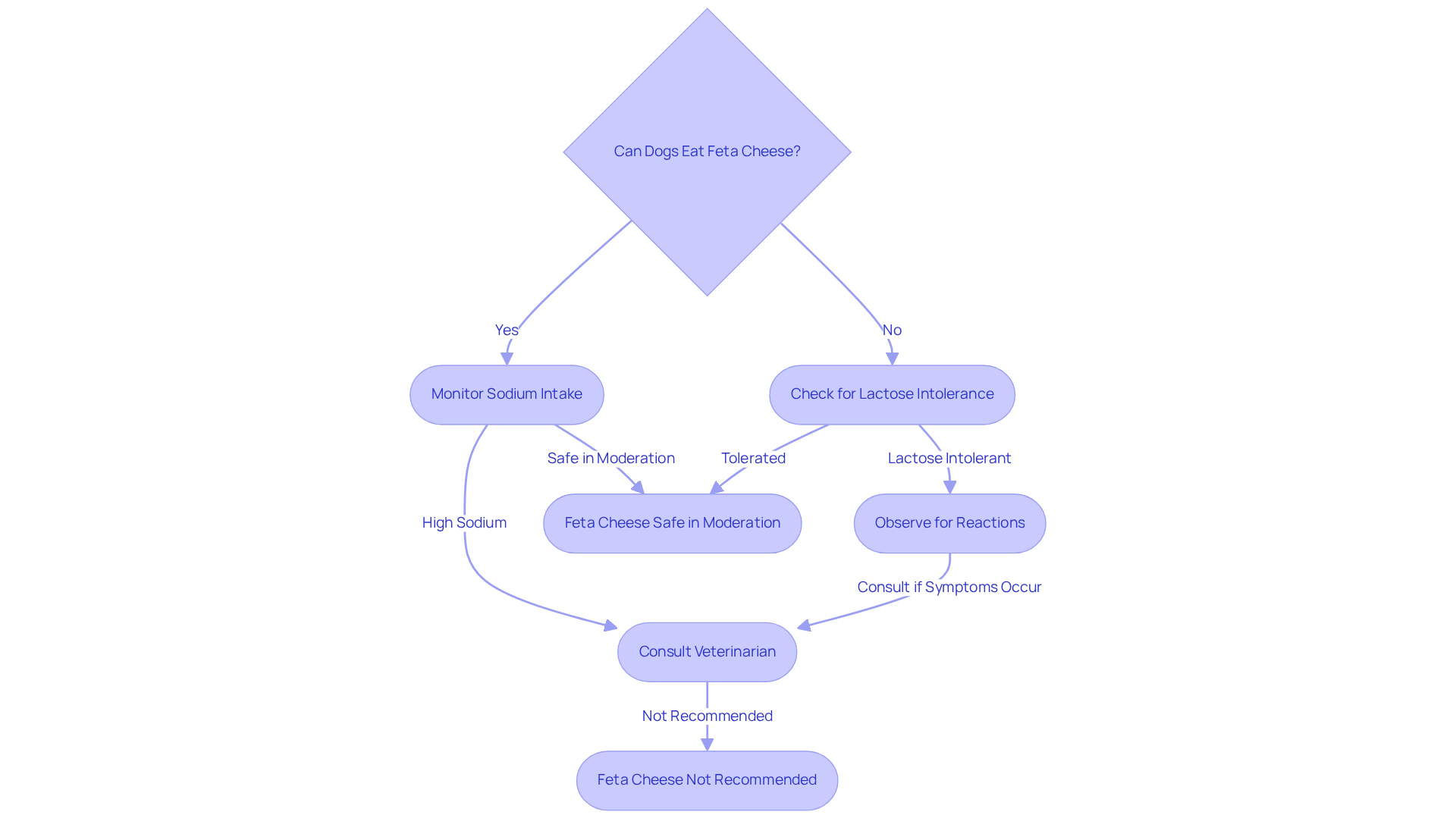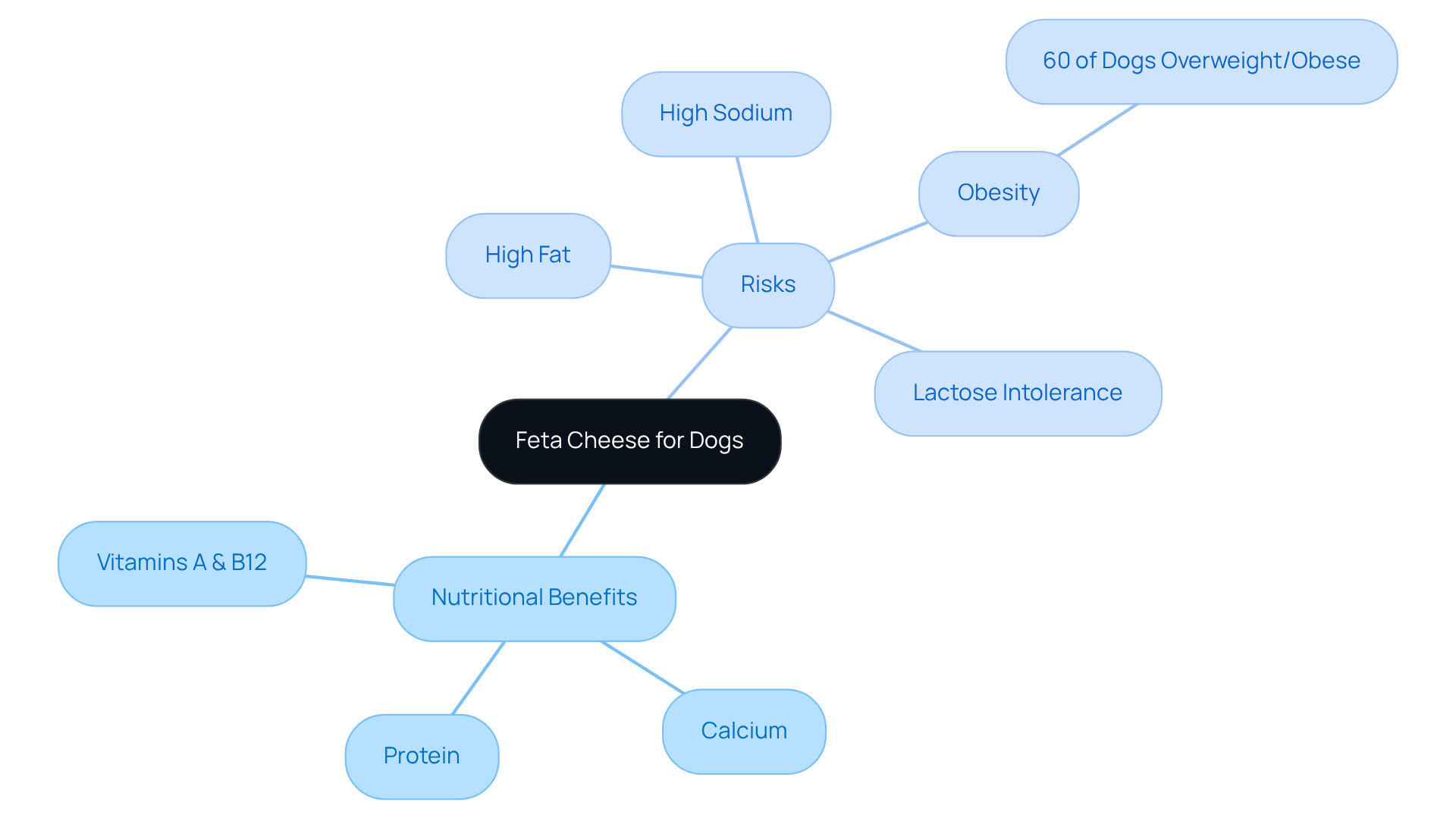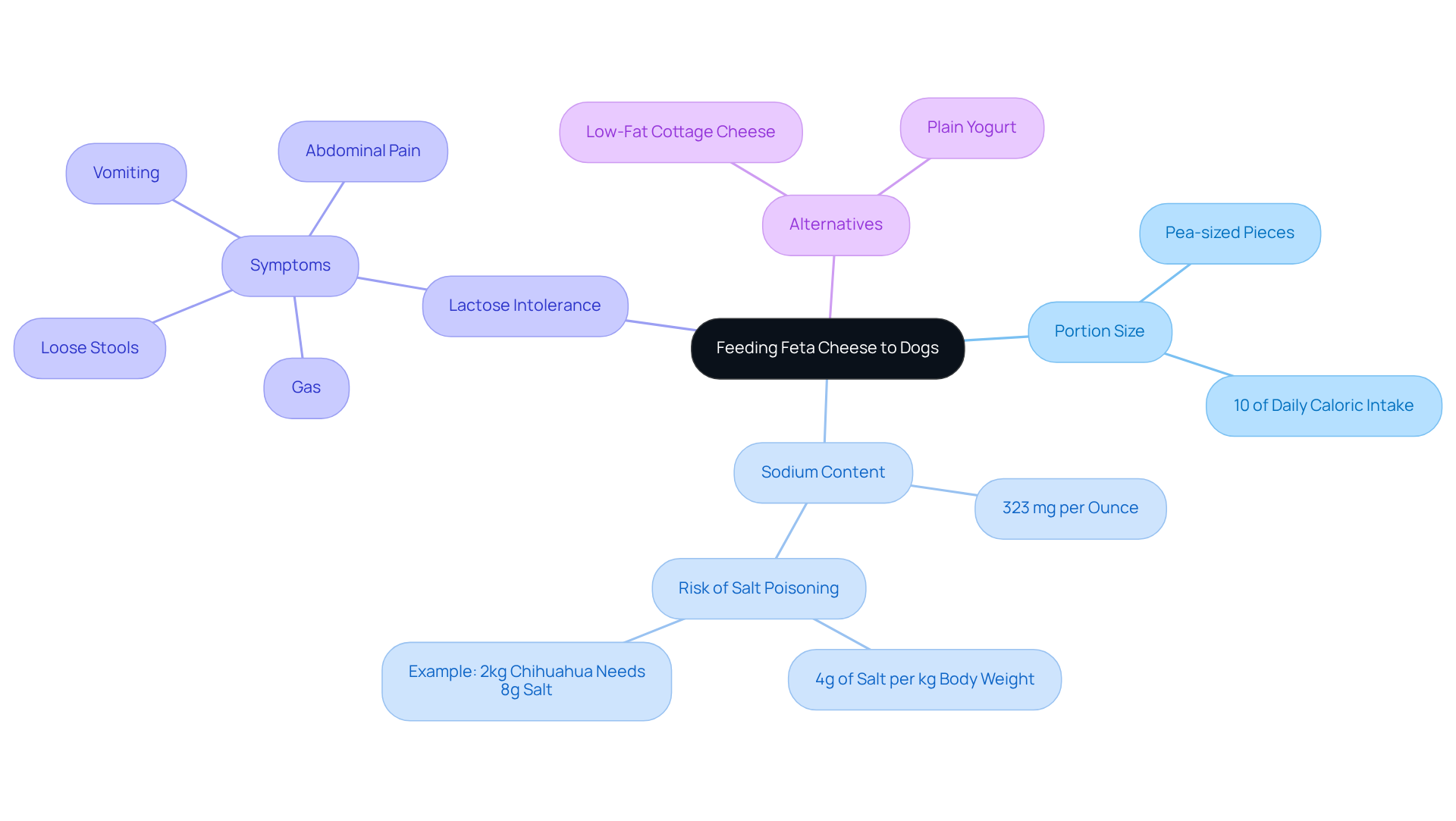Can Dogs Eat Feta Cheese? Safety, Benefits, and Feeding Tips
Overview
As a loving pet owner, you may wonder if your furry family members can enjoy feta cheese. While dogs can indeed eat feta in moderation, it’s crucial to approach this creamy delight with caution. The high salt and fat content can lead to health concerns, such as salt toxicity and digestive issues, particularly for dogs that are lactose intolerant.
It’s heartening to know that feta does offer some nutritional benefits, including protein and calcium. However, the risks associated with excessive sodium and fat intake are significant. That’s why it’s always best to consult your veterinarian before introducing feta cheese into your dog’s diet. They can provide personalized advice to ensure your beloved pet remains healthy and happy.
By prioritizing your dog’s well-being, you create a nurturing environment where they can thrive. Remember, your veterinarian is there to help you navigate these dietary choices, ensuring that every treat you offer is safe and beneficial for your furry companion.
Introduction
The culinary world is a treasure trove of flavors, and feta cheese, with its tangy essence and crumbly texture, holds a cherished spot in many kitchens, especially within Mediterranean cuisine. For dog owners, however, a pressing question arises: can this delightful cheese be safely shared with our furry family members?
While feta does present some nutritional benefits, the potential risks tied to its high sodium and fat content warrant careful consideration regarding its suitability for dogs. What should loving pet owners keep in mind before introducing feta cheese into their dog’s diet? How can we ensure that our pets can enjoy it safely and healthily?
Define Feta Cheese: Characteristics and Composition
Feta, a beloved brined curd product with roots in Greece, is traditionally made from sheep’s milk or a delightful blend of sheep and goat’s milk. Its crumbly texture and tangy flavor come from a careful fermentation process, resulting in a distinctive white cheese that boasts high moisture content, setting it apart from drier varieties. For many, this dairy delight is a staple in Mediterranean cuisine, celebrated for its richness in calcium, protein, and essential vitamins. However, as caring pet owners, it’s crucial to consider the question of can dogs eat feta cheese and how this might affect our furry family members.
While feta cheese offers certain nutritional benefits—like approximately 5.3 grams of protein and calcium per ounce—its elevated salt levels, around 323 milligrams, and fat content, about 6.1 grams, lead to concerns about whether can dogs eat feta cheese, especially for those with lactose intolerance. Excessive sodium can lead to salt toxicity, while the high fat content may upset their delicate digestive systems. Moreover, dogs that are lactose intolerant could experience unpleasant digestive issues, including loose stools, gas, vomiting, and abdominal pain when consuming dairy products.
To ensure the health and happiness of your beloved pet, it’s essential to consult with a veterinarian regarding the question of can dogs eat feta cheese before introducing it into their diet. This way, you can make informed choices that nurture their well-being and keep them thriving in your loving home. Remember, your dog’s health is paramount, and taking these precautions will help you create a nurturing environment for your furry friend.

Assess Safety: Can Dogs Eat Feta Cheese?
As a loving pet owner, you may wonder if your furry family members can enjoy dairy like feta, and specifically, can dogs eat feta cheese? It’s important to consider whether dogs can eat feta cheese in moderation, as it shouldn’t be a main component of their diet. The elevated salt concentration in feta poses potential health risks, including salt ion toxicity, particularly for canines with pre-existing health issues. To illustrate, 100g of feta contains approximately 917mg of sodium, and studies indicate that excessive sodium consumption can lead to dehydration and high blood pressure in dogs. Therefore, it’s essential to monitor your pet’s total sodium intake, ensuring that feta constitutes no more than 10 percent of their daily calorie intake.
Additionally, some dogs may be lactose intolerant, which can lead to gastrointestinal discomfort when they consume dairy products like feta. Signs of lactose intolerance can include diarrhea, vomiting, and bloating. Thus, it’s crucial for you to observe your pet closely for any adverse reactions when introducing sheep’s milk dairy into their diet. Consulting with a veterinarian is always a wise step to ensure that any dietary changes are safe and suitable for your individual dog’s health needs.
As highlighted by Rockdale Animal Hospital, dairy can be a safe and enjoyable snack for most dogs when offered in moderation. By prioritizing your dog’s well-being and being aware of the potential risks, you can make informed choices about whether dogs can eat feta cheese as an occasional treat. Remember, your furry family members deserve the best care, and with the right knowledge, you can create a nurturing environment for them.

Evaluate Nutritional Benefits and Risks of Feta Cheese for Dogs
It’s important to know that while feta cheese offers some nutritional benefits for your furry family members, including protein, calcium, and vitamins A and B12, one might wonder, can dogs eat feta cheese? However, it’s important to consider that the risks may outweigh these benefits. The high fat and sodium content in feta can contribute to obesity and other health issues when consumed in excess. In fact, according to the Association of Pet Obesity Prevention, around 60 percent of dogs are classified as overweight or obese. This statistic underscores the need for thoughtful dietary choices for our beloved pets.
Additionally, many dogs may be lactose intolerant, which can lead to digestive discomfort when they consume dairy products like ricotta. Older dogs, in particular, require about 50 percent more protein than their younger counterparts, making it crucial to monitor their nutritional intake closely. While it is important to consider whether can dogs eat feta cheese as a delightful treat for pets, it should be offered in moderation and with care. By prioritizing their health and well-being, we can ensure that our pets lead happy and fulfilling lives.

Guide to Feeding Feta Cheese: Portions and Alternatives
When considering cheese for your furry family members, moderation is key. A small piece, about the size of a pea, can be a delightful occasional treat, but it should not make up more than 10% of your dog’s daily caloric intake. It’s important to be mindful of feta’s high sodium content—approximately 323 milligrams per ounce—when considering can dogs eat feta cheese. Excessive sodium can lead to salt poisoning, particularly in smaller animals. Always keep an eye out for any signs of discomfort or allergic reactions after they indulge.
Many dogs may also face lactose intolerance, which can show up as loose stools, gas, vomiting, or abdominal pain. If you’re looking for healthier alternatives, you might wonder if can dogs eat feta cheese, along with low-fat cottage cheese or plain yogurt. These options can provide similar flavors without the excessive salt. Remember, it’s always wise to consult your veterinarian before introducing new foods into your dog’s diet to ensure they align with your pet’s specific health needs. Your dog’s well-being is our priority, and we’re here to support you in creating a nurturing environment for them.

Conclusion
Feta cheese, with its distinctive flavor and nutritional profile, can indeed be a tempting treat for your furry family members. However, it’s essential to approach this indulgence with caution. While feta contains beneficial nutrients like protein and calcium, its high sodium and fat content can pose significant health risks. Understanding the balance between these potential benefits and dangers is crucial for responsible pet ownership.
When considering feta cheese as a treat, moderation is key—especially for dogs with lactose intolerance or pre-existing health conditions. The risks associated with excessive sodium intake, such as dehydration and obesity, underscore the importance of carefully monitoring your dog’s diet. Consulting with a veterinarian before introducing feta cheese can help ensure that your dietary choices align with your pet’s health needs.
Ultimately, prioritizing your dog’s well-being is paramount. By making informed decisions about their diet and exploring healthier alternatives, you can create a nurturing environment that promotes the health and happiness of your beloved companions. Always remember, treating feta cheese as an occasional indulgence rather than a staple in your dog’s diet is the best approach, ensuring they thrive under your care.
Frequently Asked Questions
What is feta cheese and how is it made?
Feta cheese is a brined curd product traditionally made from sheep’s milk or a blend of sheep and goat’s milk. It has a crumbly texture and tangy flavor resulting from a careful fermentation process.
What are the nutritional benefits of feta cheese?
Feta cheese is rich in calcium, protein, and essential vitamins, offering approximately 5.3 grams of protein and calcium per ounce.
Can dogs eat feta cheese?
While feta cheese has nutritional benefits, it is important to consider its high salt (around 323 milligrams) and fat content (about 6.1 grams), which could pose health risks for dogs, especially those with lactose intolerance.
What are the potential risks of dogs consuming feta cheese?
Excessive sodium in feta cheese can lead to salt toxicity in dogs, while the high fat content may upset their digestive systems. Dogs that are lactose intolerant may experience digestive issues such as loose stools, gas, vomiting, and abdominal pain.
Should I consult a veterinarian before giving my dog feta cheese?
Yes, it is essential to consult with a veterinarian before introducing feta cheese into your dog’s diet to ensure their health and well-being.







